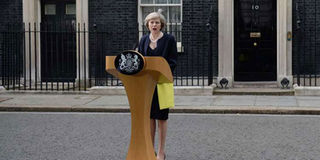After Thatcher, woman leads Britain again as female factor takes over

Britain's new Prime Minister Theresa May speaks outside 10 Downing Street in central London on July 13, 2016, the day she took office following the formal resignation of David Cameron. Mrs May became Britain's second female prime minister after Margaret Thatcher. PHOTO | OLI SCARFF | AFP
What you need to know:
So much is happening in British politics, it would be imprudent to declare that everything is changing for women.
But now that Mrs May has taken up residence in 10 Downing Street, the traditional home of British prime ministers, it is hard not to see it as a female victory over the Eton and Oxford alpha males who have ruled for so long.
The BBC ran a feature last week, “Are women taking over British politics?” The country has just got its second female prime minister, Theresa May, and with most of the smaller parties already headed by women, the question must be: have the long years of male domination come to an end?
Certainly, no women could have made a worse hash of recent political problems than Prime Minister David Cameron, who recently resigned, and his fellow Conservatives (but opponents on Europe) Boris Johnson and Michael Gove. It is unsurprising that many voters are harking back to the certainties of Margaret Thatcher, who left office 26 years ago after 11 years as prime minister.
Young Westerners might be surprised to learn that the drive for female national leadership came not from Europe or America but from what today is loosely called the Third World. The first female head of government in modern times was Mrs Bandaranaike of Ceylon, later Sri Lanka, who won office in 1960 and went on to serve three terms. Indira Gandhi was a hard-line prime minister of India, and Golda Meir was Israel’s fourth prime minister, serving for five agonising years.
On the global stage today, the United States could soon get its first female president in Hilary Clinton, while Angela Merkel of Germany is effectively leader of the European Union.
Britain’s opposition Labour party has never had a woman leader, but Angela Eagle is challenging the under-fire Jeremy Corbyn. Scotland’s First Minister is the redoubtable Nicola Sturgeon, while Leane Wood leads Wales’ Plaid Cymru, and Nathalie Bennett heads the Green Party.
That a Conservative woman has reached the top is no accident. Organisations such as Conservative Women and Women2Win have identified talented women and got them into winnable parliamentary seats. Ten years ago, there were just 17 women Conservative MPs. Now there are 68.
Experts warn that it would be unwise to greet a second female premier as “Problem solved.” The notorious “glass ceiling,” which prevents women from reaching the top in public life and business, is present in politics, too. Strong females are derided as bossy and unfeminine, as Thatcher was. Plus, newspapers and TV tend to target their looks, dress, ages and family lives in a way they do not for male MPs.
So much is happening in British politics, it would be imprudent to declare that everything is changing for women. But now that Mrs May has taken up residence in 10 Downing Street, the traditional home of British prime ministers, it is hard not to see it as a female victory over the Eton and Oxford alpha males who have ruled for so long.
***
“Can you cheer us up?” a reporter asked Britain’s top tennis player, the Scot Andy Murray. He looked puzzled. The reporter went on: “We’ve been kicked out of European football by tiny Iceland, we’re kicking ourselves out of the European Union, both of our major political parties are in turmoil, and the pound has hit its lowest point in 31 years. Can you please win Wimbledon for us?”
“Is it as bad as that?” asked Murray drily, then duly obliged, defeating the Canadian Milos Raonic in straight sets and thereby winning the Wimbledon tournament, top prize in professional tennis, for the second time. And to cheer up gloomy Brits a bit more, on the same day England’s top Formula 1 driver, Lewis Hamilton, charged to victory in the British Grand Prix.
But for me, the outstanding moment in the welter of sporting emotions came after the final of the European Championship, when Portugal beat the favourites France 1-0. A roving camera focussed on a spectator in the blue shirt of France with his head in his hands, apparently sobbing. A small boy, aged about nine, wearing the red shirt of Portugal, touched him gently on the arm. The Frenchman looked up, surprised, then gathered the boy into his arms and they joined in a healing hug.
***
England’s humiliation in the Uefa European Championship – defeated by Iceland, a country with a population of 323,000 – led to the usual deluge of bitter jokes.
– “I’ve won two tickets to see England, would you like to come with me?” “Sure, we’ll take the bus to London airport to watch them come home.”
– What is the difference between the England football team and a tea bag? The tea bag stays in the cup longer.
– Why are England footballers not allowed to own a dog? They cannot hold on to a lead.
– The former England football manager Roy Hodgson is likely to lead Britain’s negotiations over the future of the country. He is used to getting us out of Europe.
– Before their big match, the England football team visited an orphanage for abandoned children. “It was good to put a smile on the faces of sad people without hope for the future,” said Charlie, aged six.




